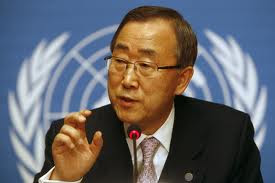The UN says former Libyan rebels are holding approximately 7,000 prisoners. It believes the detainees are being held without right to legal process because the police and courts are not functioning, and some may have been tortured. The UN suspects that many of the sub-Saharan Africans were hired by Colonel Mu'ammar Qadhafi as mercenaries during the war.
It is thought that the new Libyan government has taken heed of the situation and promised to deal with the issue in a responsible way. This is the first UN assessment of Libya since the end of the eight month conflict.
The report issued by UN Secretary General Ban Ki-moon, suggests that 7,000 captives are presently held in detention centres across the country under guard by revolutionary groups.
Speaking about the situation Ban Ki-moon said: “I believe the leaders of the new Libya are committed to building a society based on the respect for human right…While the (National Transitional Council) has taken some steps toward transferring responsibility for the detainees from brigades to proper state authorities, much remains to be done to regularize detention, prevent abuse and bring about the release of those whose detention should not be prolonged," the report says.”
He continued: “I believe that the leaders of the new Libya are indeed committed to building a society based on the respect for human rights… Achieving this requires the earliest possible action, however difficult the circumstances, to end arbitrary detention and prevent abuses and discrimination, against third country nationals as well as against any group of Libya's own citizens.”
In related news, UN envoy to Libya Ian Martin welcomed last week's appointment of an interim government in Tripoli.
Speaking to the BBC, Martin said: "It is indicative of the difference from the attitudes of past regime that there is no denial that human rights are being violated and in most cases international organisations are granted access to detainees…The new minister of the interior told me he welcomed public criticism as strengthening his hand in tackling the issues.”
Libya's new government was assembled by the newly elected interim Prime Minister Abdurrahim al-Keib. It now faces many challenges including, drafting of a constitution and holding democratic elections by next June.
Sources: BBC News, Reuters, Bloomberg
For more news and expert analysis about Libya, please see Libya Focus and Libya Politics & Security.
© 2011 Menas Associates
Subscribe to:
Post Comments (Atom)

No comments:
Post a Comment